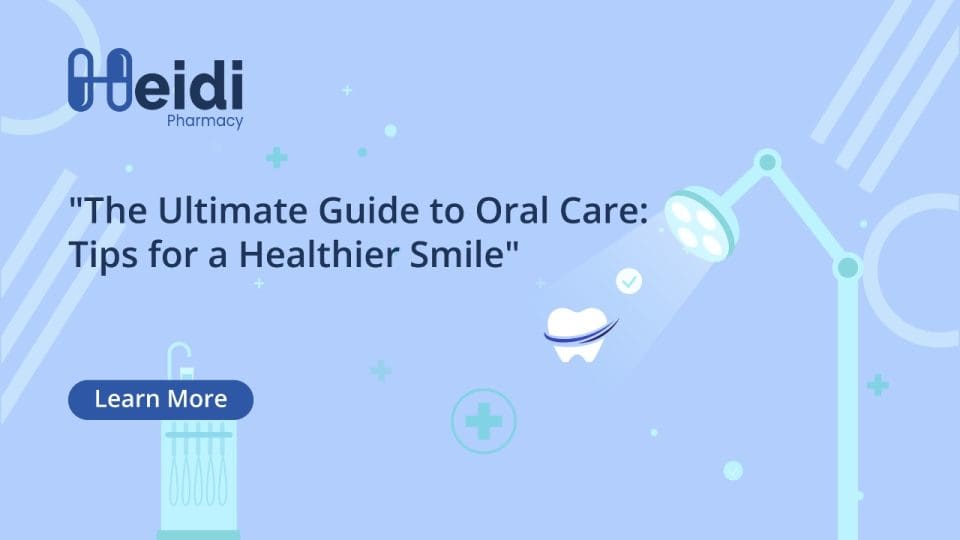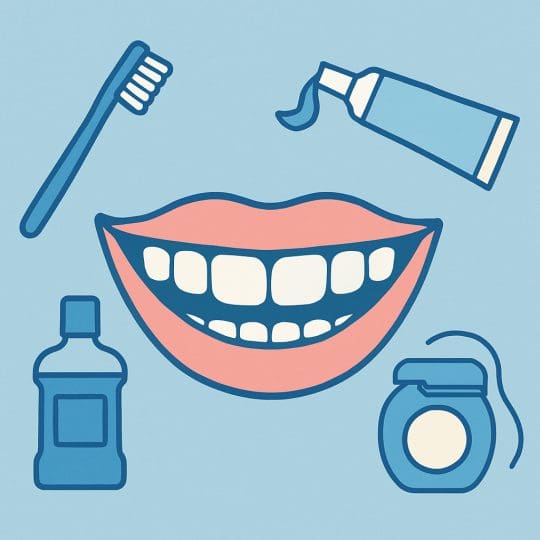
A bright, healthy smile is a sign of your overall well-being and health. Brushing your teeth just a couple times a day is only one aspect of maintaining good oral hygiene; it’s a holistic habit that promotes long-term oral health and hygiene. From selecting the appropriate toothbrush to understanding the influence of your food, every small habit adds to the overall picture of your dental health care. This guide helps you to improve your oral hygiene, avoid frequent problems, and get long-lasting improvements scientifically. Everything you need to know to have a healthier, more radiant smile will be covered in this blog.
Significance of Oral Care and Oral Hygiene:
Maintaining proper dental health is crucial for the well-being of your entire body, not just your teeth. Research has indicated that inadequate dental hygiene can result in a number of illnesses, such as diabetes, heart disease, and respiratory problems. Bacteria from the mouth can affect your internal organs by entering your bloodstream. Because of this, maintaining clean oral care is important to protect your general oral health and well-being.
Let’s begin with the basics. The following are examples of good oral hygiene practices:
- Use fluoride toothpaste to brush your teeth at least twice a day.
- To get rid of food particles and plaque in between teeth, floss every day.
- Use mouthwash to remove bacteria and improve breath quality.
- Avoid sugary snacks and beverages.
- Maintaining hydration aids in the removal of food particles and bacteria.
- Replace your toothbrush regularly.
These simple steps are the foundation of any effective oral care routine.
Prevention of Oral Health Issues:
By taking proactive measures to maintain your dental health, you can prevent common problems such as:
- Tooth decay is caused by plaque accumulation, particularly in places that are difficult to access. Fluoride, consistent brushing, and flossing can prevent this.
- Red, swollen gums are the first sign of gum disease (also known as gingivitis and periodontitis), which can develop into dangerous infections. It can be prevented by avoiding tobacco, getting regular dental cleanings, and practicing good oral hygiene.
- Bad breath is often caused by bacteria and leftover food particles. Frequent mouthwash, tongue cleansing, and brushing promotes optimal oral health.
- Tooth Sensitivity may be caused by gum recession or enamel wear. Use sensitive-tooth toothpaste and stay away from acidic foods and beverages.
Early medical dental care is essential if you suffer from any of these problems to avoid long-term damage.
Choose Right Dental Products:
With so many choices, it’s simple to become overwhelmed. Choosing the right products is essential for maintaining oral hygiene and health at every stage of life. Here’s is a what to look for,
- The ADA Seal of Approval certifies that the product meets high standards of safety.
- Fluoride toothpaste lowers the incidence of cavities and strengthens enamel.
- Alcohol-Free Mouthwash is effective but better for sensitive mouths.
Regular Dental Visits:
Regular dental appointments are essential for preserving oral health, regardless of how strict your home routine is. Your dentist can guide the customized medical dental care plan, perform expert cleanings, and identify problems early. Make an effort to see your dentist at least twice a year, or more regularly if you have a history of cavities, diabetes, or gum disease. Preventive care is always more affordable and effective– than reactive treatments for oral care.
Regular examinations are the foundation of quality dental care. A dentist can:
- Recognize problems before they get out of hand.
- Provide expert cleanings to remove tartar buildup.
- Provides personalized guidance depending on your dental need.
To maintain good dental health, consult your dentist at least twice a year. If you have specific concerns or medical conditions, your provider could recommend more regular checkups.

Clean Oral Care at different stages:
Your oral hygiene needs to change with time. Here’s how to care for your mouth at every age.
- Children: Brushing and flossing should be introduced at a young age. Schedule dental appointments as soon as the first tooth develops. Use fluoride toothpaste in the right amounts for oral care.
- Teens: Address orthodontic difficulties and ensure correct brace hygiene. Encourage healthy snack options to promote teeth health for oral care.
- Adults: Look for early indicators of gum disease. Maintain consistent dental health care checkups.
- Seniors: Dry mouth and tooth loss are very common. For dentures or implants, use saliva substitutes and maintain with medical dental care.
At every age, it’s important to build an effective and consistent oral hygiene routine for lasting results.
To maintain clean oral care, you must have the proper tools. Here are a few essentials:
– Electric toothbrushes offer a more constant brushing action and improved plaque clearance.
– Water flossers are ideal for those who have braces or dental implants.
– Tongue scrapers can help eliminate bacteria and enhance breath.
– Interdental brushes are useful for cleaning bigger gaps between teeth.
These advanced clean oral care tools can help to improve your dental hygiene and overall wellness.
Benefits of Proper Oral Care:
- Prevention of gum disease and cavities: Brushing and flossing on a daily basis helps to remove plaque, a sticky film that causes tooth decay and gum inflammation.
- Improves Overall Health: Proper oral hygiene lowers the risk of systemic disorders like heart disease, strokes, and diabetes.
- Increases Self-Confidence: Whiter teeth, better breath, and a clean smile boost your self-confidence and interactions with others.
- Reduces the need for medical intervention: Preventive dental health care reduces the need for fillings, root canals, and operations, saving you money and causing less suffering.
Simple Lifestyle Changes to improve Oral Hygiene and Smile Brighter:
A clean, healthy smile may change the way you see yourself and others see you. By establishing a daily routine, being informed, and scheduling frequent checks, you invest in more than just your oral health; you invest in yourself. A proactive approach to clean oral care results in fewer problems, cheaper costs, and more confidence. Whether you’re beginning from scratch or fine-tuning your routine, there’s always something you can do to improve your dental hygiene and have a better, healthier smile.
- Use whitening toothpaste with care and avoid overuse to prevent enamel wear.
- Avoid staining foods like coffee, tea, and red wine.
- Rinse your mouth after meals to remove residue.
- Brushing is required after drinking coffee or tea to maintain fresh oral care.
- Consider professional whitening treatments under your dentist’s guidance.
- Minimize the snacking between the meals to prevent plaque buildup.
- Chew sugar-free gum to increase saliva production.
- Give up smoking, which raises your risk of oral cancer and gum disease.
- Do not grind your teeth as this might cause enamel wear.
Your long-term dental hygiene may be significantly impacted by each of these lifestyle changes.
Conclusion:
Whether you’re a beginner or trying to improve your dental routine, this guide will teach you everything you need to know to achieve and maintain a radiant, healthy smile. Remember that your mouth is the gateway to your body. Treat it with care by maintaining good oral hygiene, developing healthy habits, and seeking regular dental health care. Your path to a healthier, happier you begin with a simple commitment: prioritize your dental hygiene and health every day.

